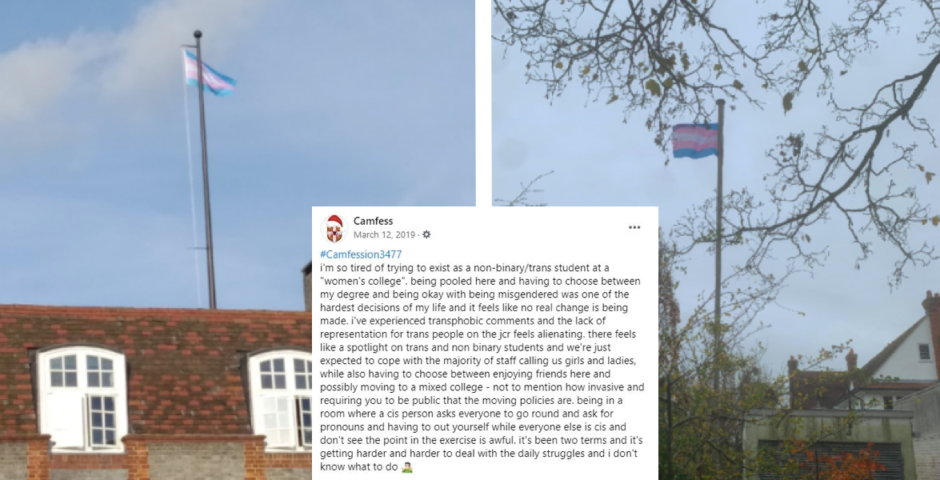
Opinion: Women’s Colleges are not Feminist Projects
An anonymous trans student at one of Cambridge’s women’s colleges argues why women’s colleges need to become a thing of the past
My housemate got ill recently. Fortunately it wasn’t coronavirus, but we all had to isolate until her test came back. I was out when the news broke. When it came time to re-enter college, knowing that it would be at least two days, perhaps two weeks, until I could leave again, I nearly had a panic attack. Such is the life of being at a women’s college, and not being a woman.
‘All these colleges do is put women atop the hierarchy rather than dismantling it’
It’s commonly accepted that not everyone who goes to Newnham or Medwards is a woman. Though they are nominally the women’s colleges, most students and indeed some staff would refer to the student body as “women and non-binary people”. While this phrase has its uses, staff and student representatives often act like it has made women’s colleges gender-inclusive. It is treated as “the right thing to say”, with no further critical engagement with gender, or who “women and non-binary people” refers to, required.
Saying “women and non-binary people” does nothing to make people who are not commonly read as such feel welcome. This can include butches, transfemmes, non-binary people who’ve taken testosterone, and many more experiences of gender than I could possibly list. All these colleges do is put women atop the hierarchy rather than dismantling it. Furthering feminist progress means we have to degender the women’s colleges: remove gender as a criterion for admission all together, and render them a thing of the past.

Where’s the love for the Medwards boys and non-binary people? Credit: Camfess via Facebook
Policing access to a space on the basis of appearances will inevitably cause harm. Whether this is carried out on the basis of race, age, disability or gender, it is antithetical to feminist goals of liberation. Gendering a college creates more standards by which to monitor students and police their activities. Arranging those standards to direct the harm onto others–namely trans and gender non-conforming people–in order to protect yourself isn’t doing anything to liberate anyone, it’s throwing other marginalised people under the bus.
Many who engage in feminist politics are aware of this, but would disagree that we need to degender these colleges. Self-ID – taking someone as the authority on their own gender rather than requiring some form of “official” proof like a gender marker on a passport – is a basic starting point that all women’s spaces should use. It’s a low bar, and one that Newnham is still yet to meet, but it isn’t enough. Being allowed into a space on paper doesn’t necessarily mean you’ll feel safe there, especially for people who don’t fit into neatly the normative category of “women and non-binary people”.
‘Women’s colleges are complacent because they are assumed to be radical, feminist spaces for merely existing’
The most common argument for why women’s colleges are necessary is that they can provide a space safe from cisgender men, while still being inclusive of all marginalised genders. I am no stranger to feeling discomfort and fear around cis men. They are largely responsible for the trauma and violence I have experienced, and I am hypervigilant because of that. In therapeutic and organising spaces, strategic exclusion can be necessary to overcome this. But that’s not what colleges are. A college is like your landlord, if your landlord also had the power to impose sanctions directly impacting your academic life and welfare if you ever breached your license.

Credit: Camfess via Facebook
Women’s colleges are complacent because they are assumed to be radical, feminist spaces for merely existing; this is just not the case. It’s almost more frustrating than the colleges who are more blatant about enforcing their power. While the main defence remaining for women’s colleges is that they are safe spaces prioritising the needs and education of those oppressed under the patriarchy, that isn’t how they are experienced by many.
It doesn’t line up with the horror I felt at the prospect of being trapped in what is meant to be my term-time home for two weeks. It’s hard to feel welcome somewhere where staff ask you if you go there, where you’re constantly under scrutiny, and you have to constantly shout at the top of your lungs to even be acknowledged, only to be dismissed as overly sensitive for doing so. Invasive policing of what students do is not unique to the women’s colleges. But limiting access to a space on the basis of gender gives them another means by which to do so.
‘For many marginalised people, the more policed a space is, the less safe we feel’
Many colleges treat their students appallingly with regards to rent, reporting harassment, and in countless other ways, and the gendering of women’s colleges is an additional barrier when it comes to fighting these issues. They protect the power of the gender binary. By limiting access on the basis of a narrow understanding of gender, women’s colleges reinforce the idea that gender is a fixed, visibly legible, “natural” category.
All transphobia operates on the basis of that assumption. For many marginalised people, the more policed a space is, the less safe we feel. With colleges becoming more invasive under the guise of enforcing Covid-19 guidelines, it has been made acutely clear that marginalised students are unsafe in the places we are meant to call home.
Beyond individual colleges, we need to radically restructure the university, which won’t surprise anyone familiar with the colonial basis of its power and wealth. This is a space set up by powerful white men to create new generations of powerful white men.
It needs to do a far better job of dealing with harassment, sexual misconduct, and violence. There has been an institutional failure to address the culture that produces this harm, and the women’s colleges are a part of this; they are a stopgap and don’t actually deal with the underlying problems. Degendering them is a small step towards change, but a crucial one.
‘To make a space truly inclusive, you have to degender it’

A constant mood for trans students at “women’s Colleges” . Credit: Camfess via Facebook
You may still be convinced that even if they aren’t actively helpful, women’s colleges could exist without doing harm, provided we work to make them inclusive to all marginalised genders. But if you implement the changes needed to make that happen, such as access to the space being informed by personal choice, belonging not being assumed on the basis of appearance, and using gender-neutral language and policy, then you don’t actually have a women’s college any more. To make a space truly inclusive, you have to degender it.
Conversely, making a college for “women and non-binary people” and being consistent about it forces you to take the position that those who enrol and later come out as trans men have to leave the college, whether or not they want to. Women’s colleges don’t actually take this position: they know it’s untenable. The systems of sex and gender as we know them are unstable, and someday things will have to change. But this is wilfully ignored by many- an effect of living in a space that assumes you can legitimately segregate on the basis of gender. Treating this as truth means those within it aren’t prompted to confront transphobic notions that they have unknowingly internalised, and therefore many do not do so.
A spokesperson for Murray Edwards has said: “Murray Edwards aims to create an inclusive environment for all members of the College, and we take pride in our open and friendly community. We are a College for women and we will consider any student who identifies as female for admission. We do know that we have transgender and non-binary students in the College, and we are aware of the issues they face. We were happy to support the creation of a new Trans and Non-binary Officer role within the JCR Committee this year.”
A spokesperson for Newnham College has said: “The college prides itself on being a welcoming environment for all female students, regardless of gender assigned at birth.”
“Students who transition while at Cambridge can choose to move to a mixed college, or, if they prefer, remain at their original, women’s college. We’re happy to support students in their choice.”
But as a trans person, I can’t just turn my thoughts to some other matter. I can’t ignore that despite the apparent acceptance that college is not just a place for women, I am almost always gendered as female by default of existing here, and I will be until the day college is degendered. I have to engage with my gender, how it is read, and how it interacts with the gendered space I live in, every single day. It’s extremely frustrating that people who think of themselves as allies won’t take on any of the work of critically engaging with gender. Trans people don’t get the luxury of not doing so.









































